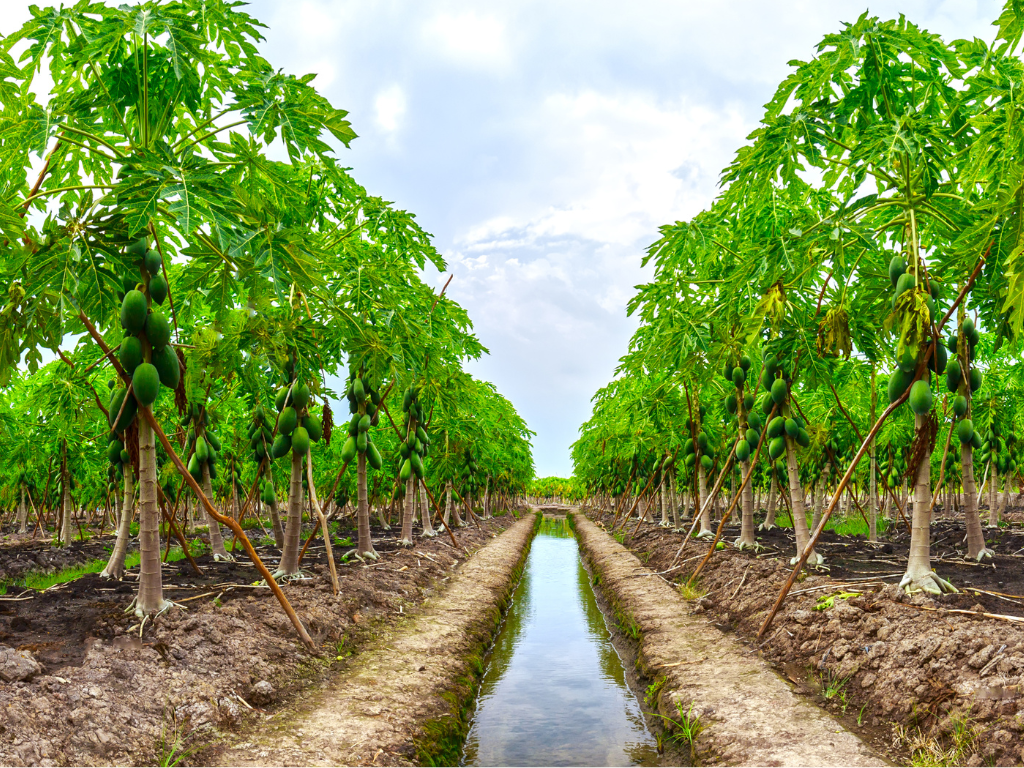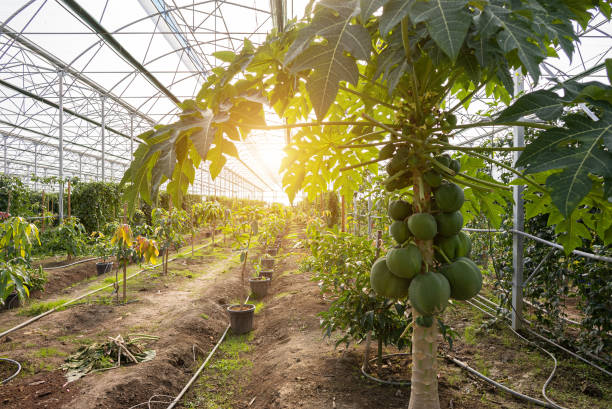Pawpaw tree plantation or Pawpaw tree farming is an important agricultural business in Nigeria and Africa due to the high demand for pawpaw fruits, both locally and internationally. Pawpaw fruit is a rich source of essential vitamins, minerals, and antioxidants that provide numerous health benefits, making it a popular choice for consumers. Pawpaw tree plantation has the potential to generate significant revenue for farmers thereby contributing to the economic growth of the economy.
Pawpaw tree plantation in Nigeria
According to the Food and Agriculture Organisation (FAO) of the United Nations, Nigeria is the largest pawpaw fruits producing country in Africa, which makes it the fourth largest producer of the fruit globally. Other top pawpaw-producing countries in Africa include Ghana, Cameroon and Cote d’Ivoire. According to research, the local market for pawpaw friuts in Nigeria is vast and provides a significant opportunity for farmers to earn profit from sale of pawpaw fruits. Additionally, the Nigerian Export Promotion Council (NEPC) informed that the country exported 4,000 tonnes of pawpaw fruits in 2020, with an estimated value of US$2.7 million. This gives a platform of opportunities for farmers to invest in pawpaw tree plantation.

How to plant pawpaw trees
Planting these trees requires careful consideration of soil and climate conditions. Here are some tips to get you started:
- Soil requirements: The Pawpaw trees prefer well-draining, fertile soil with a pH range of 6-7.
- Climate requirements: Pawpaw tree grow well in tropical and subtropical regions with adequate sunlight and water.
- Planting distance: Plant trees 4-6 meters apart to allow for proper growth and fruit production.
- Planting duration: It is important for farmers to note that it takes close to nine months after transplanting for the fruit to be ready for harvesting, as the appearance of traces of yellow colour on the fruit indicates that it is ready for harvesting also note that fruits harvested early have longer post-harvest life, although it may give abnormal taste and flavour.
- The pawpaw tree, when planted, grows around a slightly acidic soil, well-draining, and one that’s fertile for good growth and fruit reproduction, as it requires a compost that can be added to help with the soils quality and overall health, as younger pawpaw plants require frequent watering. According to Steve Bender, who is also known as The Grumpy Gardener, a senior writer and an experienced garden editor, in one of his publications on “Why pawpaws are the ideal fruit trees for your garden”, he explained that planting pawpaw plants helps foster biodiversity and support wildlife, and that its flowers are a valuable nectar source for pollinators, as the pawpaw fruit serve as food for various wildlife, including birds and small mammals.
Benefits of pawpaw tree plantation
Pawpaw tree plantation offers numerous benefits, including:
- Economic benefits: Pawpaw tree plantation generate significant revenue and contribute to economic growth. The pawpaw fruit usually come in different varieties and one of the reasons for farmers not being successful in this type of farming, most especially in Kenya, is because the right variety and the area have not been chosen
- Health benefits: Provide essential vitamins, minerals, and antioxidants. Also, it’s quite important to know that green fruits can as well be pickled or cooked, as a vegetable from the plantation of these trees. One very important thing farmers need to pay attention to about the pawpaw tree is that it is usually being used as a favourite breakfast and dessert fruit that is available year round. Pawpaw Fruit can be made into crystallized fruits, fruit salads, refreshing drinks, marmalade and other forms.
- Environmental benefits: Pawpaw trees grow well in diverse environments and is resistant to pests and diseases. The trees are beneficial in riparian zones, between land and a river or stream, as its roots help in erosion control, making it ideal for wetland remediation projects. In summary pawpaw trees foster biodiversity, support wildlife, and prevent erosion.
Challenges facing pawpaw tree plantation and solutions
Despite the benefits of pawpaw farming, it is essential to note that pawpaw tree plantation is faced with some agricultural challenges such as
- Pests and diseases: Regularly monitor your trees for signs of pests and diseases, and take prompt action to prevent infestations.
- Inadequate finance: Explore financing options, such as loans and grants, to support your pawpaw tree plantation.
- Lack of proper infrastructure: Invest in proper infrastructure, such as irrigation systems and storage facilities, to ensure the success of your pawpaw tree plantation.
Conclusion
Pawpaw tree plantation is a highly profitable agricultural business in Nigeria and Africa. By following proper planting, growth, and care techniques, farmers can overcome challenges and enjoy the numerous benefits of pawpaw tree plantation. More so with its increasing demand and numerous health benefits, pawpaw fruits have become a popular choice for consumers, making pawpaw tree plantation a lucrative venture for farmers.
FAQs
1. How fast do pawpaw trees grow
On average the pawpaw tree can grow to about one to two feet per year. By the time the trees begin flowering, their yearly growth slows down to focus on fruit production. This change occurs around the fifth year after being planted.
2. How deep should the pawpaw seeds planted?
Plant the pawpaw seeds 1-2.5 cm (0.4-1 in) deep in well-ventilated soil. Always ensure that the soil is kept consistently moist but not waterlogged.
3. How big do pawpaw trees get?
Pawpaw trees when in their natural habitat, have the ability to grow up to 25 feet tall.

